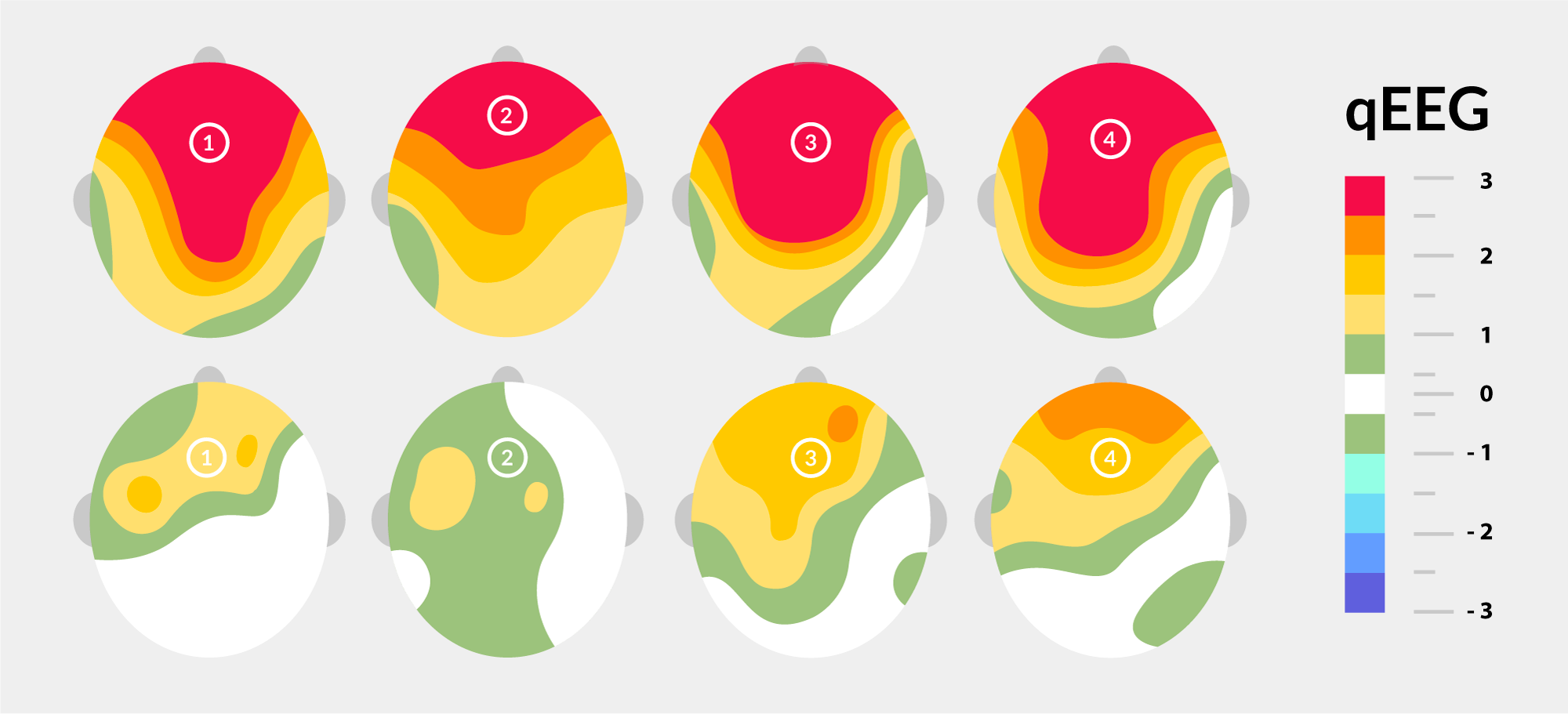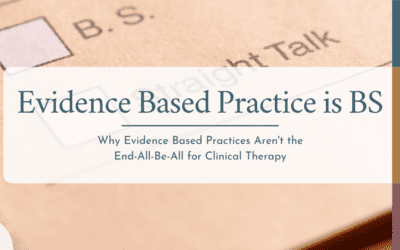The DOE reclassified social work degrees as non-professional which threatens Alabama mental healthcare access, professional liability insurance, credentialing, and the private practice model that emerged from 1980s reforms. This comprehensive analysis examines immediate and long-term implications for therapists and patients.
Evidence-Based Practice : Balancing Research and Clinical Wisdom

Navigating the Complexities of Modern Therapeutic Practice in Birmingham
Welcome to Taproot Therapy Collective’s thoughtful exploration of evidence-based practice (EBP) and its critiques in contemporary mental health care. As Birmingham’s leading integrative therapy practice, we recognize that excellent therapeutic outcomes require both rigorous attention to research evidence AND deep appreciation for the art, intuition, and individualized care that make therapy truly transformative.
Understanding Evidence-Based Practice in Mental Health
Our Evidence-Based Practice and EBP Criticism blog category examines the complex landscape of research-informed therapy while critically evaluating the limitations, biases, and cultural considerations that shape how we apply research findings to real-world clinical practice. We explore how thoughtful practitioners integrate scientific evidence with clinical expertise, client preferences, and contextual factors to provide the most effective and ethical care possible.
This nuanced approach recognizes that while research provides invaluable guidance for therapeutic interventions, the human complexity of mental health requires practitioners who can think critically about research limitations, cultural biases, and individual differences that may not be captured in standardized treatment protocols.
The Foundation and Evolution of Evidence-Based Practice
Historical Context and Development
Understanding how EBP emerged and evolved in mental health:
- Origins in evidence-based medicine and the Cochrane Collaboration
- The American Psychological Association’s adoption of evidence-based practice guidelines
- How managed care and healthcare economics influenced EBP implementation
- Research from the Cochrane Mental Health Group and National Institute for Health and Care Excellence (NICE)
The Three Pillars of Evidence-Based Practice
Exploring the foundational components as defined by the American Psychological Association:
- Best Research Evidence: Understanding study designs, meta-analyses, and clinical trials
- Clinical Expertise: The role of practitioner knowledge, experience, and clinical judgment
- Client Values and Preferences: Honoring individual goals, cultural context, and personal choice
- Integration insights from University of Alabama at Birmingham School of Medicine evidence-based practice initiatives
Randomized Controlled Trials and Research Hierarchy
Examining the gold standard of psychological research and its applications:
- Understanding RCT methodology and statistical significance
- The research hierarchy: systematic reviews, meta-analyses, and individual studies
- How research findings translate to clinical practice settings
- Insights from Harvard T.H. Chan School of Public Health methodology research
Legitimate Criticisms of Evidence-Based Practice
Cultural and Diversity Limitations
Examining how traditional EBP research often fails to represent diverse populations:
- Research Bias: Historical overrepresentation of white, middle-class, college-educated participants
- Cultural Adaptation: How evidence-based treatments may need modification for different cultural groups
- Language and Communication: Barriers in research design that exclude non-English speakers
- Systemic Racism in Research: How historical medical racism affects trust and participation
- Research from National Institute on Minority Health and Health Disparities
The “One-Size-Fits-All” Problem
Exploring how standardized protocols may not account for individual complexity:
- Comorbidity Challenges: Most research excludes clients with multiple diagnoses, yet most real-world clients have complex presentations
- Trauma and Context: How evidence-based treatments may not adequately address trauma history and environmental factors
- Neurodiversity Considerations: Adapting EBP approaches for autistic individuals, ADHD, and other neurological differences
- Insights from Stanford Medicine 25 Precision Medicine Initiative
Economic and Industry Influences
Critically examining how financial factors shape research priorities:
- Pharmaceutical Influence: How drug company funding affects research questions and publication
- Insurance Industry Impact: How managed care preferences influence which treatments are studied and approved
- Academic Incentives: Publication bias and the pressure to produce significant results
- Access and Equity: How EBP implementation can create barriers for underserved communities
- Analysis from The Cochrane Collaboration on research bias
Methodological Limitations
Understanding inherent challenges in mental health research:
- Placebo and Control Group Ethics: Ethical challenges in withholding potentially helpful treatments
- Measurement Challenges: Difficulty quantifying subjective experiences like meaning, hope, and spiritual growth
- Treatment Fidelity: How strictly following manuals may miss opportunities for therapeutic connection
- Long-term Follow-up: Most studies focus on short-term outcomes, missing long-term relapse and growth patterns
Birmingham’s Approach to Integrative Evidence-Based Practice
At Taproot Therapy Collective, we embrace a sophisticated understanding of evidence-based practice that honors both research findings and the complex realities of therapeutic work in Birmingham’s diverse community:
Cultural Responsiveness: We adapt evidence-based treatments to honor the cultural backgrounds, values, and communication styles of Birmingham’s African American, Latino, LGBTQ+, and other diverse communities.
Trauma-Informed Integration: Recognizing that Birmingham’s history with civil rights trauma, industrial accidents, and economic displacement affects how residents respond to standardized treatments.
Community Context: Understanding how poverty, housing instability, and systemic oppression in Birmingham require modifications to evidence-based protocols designed for more privileged populations.
Regional Healing Traditions: Integrating evidence-based approaches with Southern storytelling traditions, faith-based practices, and community healing methods.
Alternative and Complementary Approaches to Evidence-Based Practice
Practice-Based Evidence
Exploring how clinical practice generates its own valuable data:
- Single-Case Experimental Designs: How individual therapists can systematically study their own practice
- Clinical Outcome Measurement: Using standardized assessments to track individual client progress
- Qualitative Research Methods: Understanding client experiences through narrative and phenomenological approaches
- Community-Based Participatory Research: Involving community members in designing and conducting research
- Insights from Society for Psychotherapy Research
Precision and Personalized Mental Health
Examining emerging approaches to individualized treatment:
- Genetic and Biological Markers: How genetic testing may inform medication and therapy choices
- Digital Phenotyping: Using technology to track mood, behavior, and environmental factors
- Machine Learning Applications: AI-assisted treatment matching and outcome prediction
- Biomarker Research: Physiological indicators that may guide treatment selection
- Research from National Institute of Mental Health NIMH precision medicine initiatives
Indigenous and Traditional Healing Integration
Exploring how traditional healing practices offer evidence different from Western research:
- Traditional Ecological Knowledge: How indigenous healing practices demonstrate effectiveness over centuries
- Ceremony and Ritual: Evidence for community-based healing approaches
- Holistic Assessment: Understanding wellness beyond symptom reduction
- Intergenerational Healing: Approaches that address historical and cultural trauma
- Research from University of New Mexico Center for Indigenous Mental Health Research
Research-Based Insights from Leading Critical Institutions
We regularly incorporate balanced perspectives from:
- Stanford University School of Medicine critical methodology research
- Johns Hopkins Bloomberg School of Public Health health equity and research bias studies
- University of California San Francisco precision medicine and individual differences research
- Harvard Medical School cultural psychiatry and global mental health initiatives
- Vanderbilt University health services research and implementation science
Practical Integration in Clinical Practice
Critical Evaluation Skills for Practitioners
Developing sophisticated approaches to reading and applying research:
- Statistical Literacy: Understanding effect sizes, confidence intervals, and clinical significance
- Study Design Analysis: Recognizing strengths and limitations of different research methodologies
- Cultural Relevance Assessment: Evaluating whether research findings apply to specific client populations
- Bias Recognition: Identifying potential conflicts of interest and methodological limitations
Client-Centered Evidence Integration
Balancing research guidance with individual client needs:
- Collaborative Treatment Planning: Involving clients in decisions about evidence-based vs. alternative approaches
- Outcome Monitoring: Using measurement-based care to track individual response to interventions
- Treatment Adaptation: Modifying evidence-based protocols based on client feedback and cultural considerations
- Informed Consent: Helping clients understand both the evidence for and limitations of proposed treatments
Ethical Considerations in Evidence-Based Practice
Navigating complex ethical terrain in research-informed practice:
- Access and Justice: Ensuring that emphasis on evidence-based treatments doesn’t create barriers for marginalized communities
- Cultural Humility: Recognizing when Western research paradigms may not apply to diverse client populations
- Innovation vs. Safety: Balancing cutting-edge approaches with established safety protocols
- Transparency: Being honest with clients about research limitations and practitioner expertise
Connect with Our Evidence-Based Practice Community
For deeper exploration of these critical issues in mental health research and practice, check out more on the Discover + Heal + Grow Taproot Therapy Collective blog and podcast where we regularly feature conversations with researchers, clinicians, and advocates working to improve the integration of evidence and practice wisdom.
Subscribe to our channels for ongoing insights:
- 🎥 GetTherapyBirmingham YouTube Channel – Weekly discussions on research, practice, and clinical decision-making
- 🎧 Taproot Therapy Collective Podcast – Expert interviews on evidence-based practice, research criticism, and therapeutic innovation
- 📱 Follow us on Instagram for daily evidence-based tips and critical thinking about mental health research
- 💼 Connect on LinkedIn for professional discussions on clinical research and practice integration
- 🗺️ Find us on Google Maps for accessible, evidence-informed therapy services
- 💬 Join our Reddit community for discussions on research literacy and clinical practice
Who Benefits from Understanding EBP and Its Criticisms?
This blog category serves:
- Mental health practitioners seeking to develop sophisticated research literacy and clinical judgment
- Graduate students learning to critically evaluate research and integrate findings into practice
- Healthcare administrators making decisions about treatment protocols and clinical guidelines
- Community advocates working to ensure equitable access to effective mental health treatments
- Birmingham residents wanting to understand how research influences their therapy options
- Researchers interested in improving the relevance and applicability of mental health research
- Anyone curious about the intersection of science, practice, and social justice in mental health
Featured Article Categories
Our Evidence-Based Practice and EBP Criticism blog includes:
- Research Literacy – Developing skills to critically read and evaluate mental health research
- Cultural Adaptation – Modifying evidence-based treatments for diverse populations
- Practice-Based Evidence – Generating knowledge through systematic clinical practice
- Measurement-Based Care – Using outcomes data to guide individual treatment decisions
- Implementation Science – Understanding how research findings translate to real-world settings
- Health Equity – Addressing disparities in access to evidence-based treatments
- Professional Ethics – Navigating ethical complexities in research-informed practice
- Innovation and Tradition – Balancing cutting-edge research with time-tested therapeutic wisdom
Specialized Training and Consultation
Research Literacy Workshops: Training for mental health practitioners in critical evaluation of research literature, statistical interpretation, and evidence integration.
Cultural Adaptation Consultation: Helping agencies and practitioners modify evidence-based treatments for specific cultural communities in Birmingham and beyond.
Practice-Based Evidence Training: Teaching clinicians to systematically study their own practice and contribute to the evidence base.
Supervision in Evidence-Based Practice: Advanced clinical supervision focusing on sophisticated integration of research, clinical expertise, and client preferences.
Collaborative Research Initiatives
Community-Based Research Partnerships: Working with Birmingham community organizations to conduct research that addresses local mental health priorities and honors community wisdom.
Practice Network Studies: Collaborating with local therapists to study treatment outcomes and effectiveness in real-world Birmingham practice settings.
Cultural Adaptation Research: Studying how evidence-based treatments can be modified for specific populations served in the Birmingham metropolitan area.
Start Your Evidence-Informed Journey Today
Excellent mental health care requires both scientific rigor AND deep appreciation for the art of therapy, individual differences, and cultural wisdom. Our Birmingham-based therapists at Taproot Therapy Collective are trained to thoughtfully integrate research evidence with clinical expertise and your unique needs, values, and cultural background.
Contact Taproot Therapy Collective: 📍 2025 Shady Crest Dr. Suite 203, Hoover, AL 35216
📞 (205) 598-6471
🌐 www.GetTherapyBirmingham.com
🎧 Podcast: gettherapybirmingham.podbean.com
We provide therapy that honors both scientific evidence and the irreplaceable human elements of healing—clinical wisdom, cultural responsiveness, and individualized care.
Discover + Heal + Grow with Taproot Therapy Collective – Birmingham’s practice for evidence-informed, culturally responsive, and ethically sophisticated mental health care.
On Arrogance and Excellence: Deconstructing the Double Binds of Modern Psychotherapy
Alternative Medicine and Holistic Health, Evidence Based Practice in Therapy, Jungian Therapy and Depth Psychology, Psychology, Therapy Resources for Alabama
A deep critique of modern psychotherapy, exposing the flaws in ‘Evidence-Based Practice,’ the anti-scientific nature of the DSM, and the STAR*D scandal. This article argues that the profit motive and a ‘low-trust’ model are stifling clinical innovation.
The Tech-Enhanced Therapy Room: A Clinician’s Guide to AI, Neuro-Tech, and Vagal Nerve Stimulators
Alternative Medicine and Holistic Health, Evidence Based Practice in Therapy, Free Resources for Therapists in Private Practice
An expert review for psychotherapists on technology integration in therapy. Covers AI’s role, neuro-tech like QEEG, VR for trauma, Polyvagal Theory, and an evidence-based review of the Alpha-Stim device for anxiety, insomnia, and depression.
The IS Map: When Eye Movements Became a System
Evidence Based Practice in Therapy, Interviews and Case Studies, Models of Psychotherapy, Parts Based Therapy
Back in the 1970s, the founders of NLP claimed they'd discovered something remarkable: that you could tell what someone was thinking by watching where their eyes moved. Look up and to the right? Creating a visual image. Down and to the left? Accessing feelings. It was elegant, seductive, and as it turned out, completely unsupported by research. But here's where things get interesting. While the idea of reading thoughts through eye movements fell apart under scientific scrutiny, something else emerged. Therapists...
The Freud Legacy: Documentary Evidence of Cover-ups
Evidence Based Practice in Therapy, Mental Health and Psychotherapy Resources in Alabama, Mental Health and Trauma Therapy in Alabama, Therapy Resources for Alabama
Anna Freud's Impact on Freud's Biographical Scholarship The systematic efforts to control and sanitize the historical record surrounding Freud have had profound and lasting consequences for our understanding of psychoanalysis and its founder. The work of Frederick Crews and other critical scholars has revealed the extent to which protective narratives, institutional interests, and family loyalty combined to create and maintain a fundamentally false picture of Freud's life and work. The case serves as a powerful...
Is EMDR Pseudoscience? Is EMDR Evidence Based?
Brainspotting in Alabama: Revolutionary Trauma Therapy for Deep Healing, Evidence Based Practice in Therapy, Executive and Physician Burnout, Psychology Topics and Articles
The Complex Reality of EMDR in Clinical Practice Eye Movement Desensitization and Reprocessing (EMDR) occupies a unique and controversial position in the landscape of trauma therapy. While some practitioners report remarkable results, researchers often express skepticism about its mechanisms calling it a purple hat therapy and effectiveness. This divide between clinical experience and research findings reveals important truths about how we understand and treat trauma. Understanding EMDR's Mixed Reception EMDR...
The Trouble with Evidence-Based Practice in Psychology: Why the Field Needs to Evolve as a Soft Science
Alternative Medicine and Holistic Health, Evidence Based Practice in Therapy, Free Resources for Therapists in Private Practice
Evidence-based practice (EBP) has become the dominant paradigm in psychology over the past few decades, shaping everything from research funding priorities to clinical training curricula to third-party reimbursement policies. On the surface, EBP seems unassailable - after all, who could be against using scientific evidence to guide clinical decision-making? However, a closer examination reveals a number of deep-seated problems with how EBP is currently conceptualized and implemented in the field of psychology....
What is a “Purple Hat Therapy”?
Brainspotting in Alabama: Revolutionary Trauma Therapy for Deep Healing, Color Psychology, Evidence Based Practice in Therapy, Psychology
Purple Hat Therapy and the Evolution of Alternative: Psychotherapies From Energy Meridians to Polyvagal Stimulation Purple hat therapy, a novel approach claiming to heal through the power of colored headwear, has recently gained attention in the alternative therapy world. While its proponents assert that purple hats synchronize neural activity between brain hemispheres, this explanation lacks scientific evidence. However, purple hat therapy is not the first unconventional treatment to emerge in the history of...
Can Jungian Archetypes be Evidence-Based?
Comparative Religion for Therapy, Depth Psychology Approaches and Techniques, Evidence Based Practice in Therapy, Jungian Therapy and Depth Psychology, Metamodernism and Deconstruction
Examining the Science and Cultural Manifestations of Archetypal Psychology The concept of archetypes is a central pillar of Carl Jung's analytical psychology. Jung proposed that there are universal patterns or images that shape the human psyche and emerge symbolically across cultures and throughout history. He called these primordial images "archetypes" and believed they reside in the "collective unconscious," a layer of the psyche that is inherited rather than shaped by personal experience alone. But are Jungian...
Evidence-Based Natural Approaches to Phobia Treatment
Evidence Based Practice in Therapy, Micro-nutrition and Vitamins for Mental Health
The Science of Phobias and Evidence-Based Natural Approaches to Treatment Phobias represent one of the most common anxiety disorders worldwide, affecting approximately 10% of the population at some point in their lives. Unlike ordinary fears, phobias involve excessive, persistent fear of specific objects, situations, or activities that pose little or no actual danger. The resulting distress and avoidance behaviors can significantly impact daily functioning and quality of life, from limiting career opportunities...
Integrating qEEG BrainMapping into Your Clinical Practice
Alternative Medicine and Holistic Health, Evidence Based Practice in Therapy, Mental Health and Psychotherapy Resources in Alabama, Mental Health and Trauma Therapy in Alabama, Neuroscience and the Brain for Therapists, Therapy Resources for Alabama
Unlocking the Power of qEEG Brain Mapping and Neurostimulation: A Game-Changer for Mental Health Treatment Mental health conditions such as ADHD, autism spectrum disorder (ASD), PTSD, anxiety, and depression can significantly impact an individual's quality of life, relationships, and overall well-being. While traditional treatment approaches like therapy and medication can be effective, cutting-edge technologies such as qEEG brain mapping and neurostimulation are revolutionizing the field of mental health...
Science or Science-Flavored Capitalism? Deconstructing the Evidence-Based Practice Paradigm
Color Psychology, Evidence Based Practice in Therapy, Jungian Therapy and Depth Psychology
Evidence-based practice (EBP) has become the dominant paradigm in healthcare and mental health, promising to ground clinical decision-making in rigorous scientific evidence. Proponents argue that by privileging data from randomized controlled trials (RCTs) and systematic reviews, EBP can optimize treatment outcomes, standardize best practices, and eliminate waste from the healthcare system. However, a closer examination of the EBP movement reveals a number of epistemological, methodological, and political issues...
The Limits of Behaviorism: Rediscovering the Soul in Psychotherapy
Evidence Based Practice in Therapy, Jungian Therapy and Depth Psychology, Metamodernism and Deconstruction
For much of the 20th century, the dominant paradigm in psychology was behaviorism, which focused on observable behavior and sought to understand the mind through the lens of stimulus-response conditioning. This approach gave rise to cognitive-behavioral therapy (CBT), which remains one of the most widely practiced forms of psychotherapy today. While CBT has proven effective for certain conditions, particularly anxiety disorders, it is fundamentally limited by its reliance on a narrow, mechanistic view of the...
The Bridge Between Ancient Wisdom and Modern Practice
Anthropology and Evolutionary Psychology for Therapy, Comparative Religion for Therapy, Evidence Based Practice in Therapy, Guided Meditations for Therapy, Jungian Therapy and Depth Psychology
How Can Ancient Practices Inform Modern Therapy In today's fast-paced world, an interesting phenomenon has occurred - ancient spiritual practices that originated hundreds or thousands of years ago have undergone a remarkable transformation, evolving from their roots as sacred rituals and ceremonies into secular, evidence-based therapeutic techniques and wellness trends. A closer look reveals fascinating insights into how traditional wisdom continues to shape contemporary approaches to well-being, offering a...
When Evidence Based Practice Goes Wrong
Alternative Medicine and Holistic Health, Evidence Based Practice and Research Psychology, Evidence Based Practice in Therapy, Executive and Physician Burnout, History of Psychotherapy
Balancing Evidence and Experience: Lessons from the STAR*D Scandal and the Future of Psychotherapy For decades, **psychotherapy** has walked a tightrope between the worlds of **scientific research** and **clinical practice**. On one side, a growing emphasis on evidence-based models promises therapeutic approaches grounded in objective data. On the other, skilled clinicians rely on hard-earned wisdom, theoretical savvy, and a nuanced reading of each client's unique needs. Binding these worlds together, we...
The Science Behind Meditation: How a Regular Practice Benefits the Brain
Evidence Based Practice in Therapy, Guided Meditations for Therapy, Recovering from Abuse, Therapy Resources, Tips and Tools, Understanding Neurodivergence and Neurodiversity in Therapy
What is Meditation? Meditation, a practice with ancient roots, has gained significant attention in the field of brain-based medicine for its powerful effects on brain health and function. A growing body of scientific evidence has demonstrated that regular meditation practice can induce measurable changes in brain structure and function, leading to a wide range of cognitive, emotional, and physiological benefits. This article explores the science behind meditation and how brain-based medicine approaches are...
Harnessing Neurogenesis: How Brain-Based Medicine Promotes the Growth of New Brain Cells
Evidence Based Practice in Therapy, Recovering from Abuse, Therapy Resources, Tips and Tools, Understanding Neurodivergence and Neurodiversity in Therapy
How do I Heal My Brain? Neurogenesis, the process by which new neurons are formed in the brain, has been a topic of great interest in the field of brain-based medicine. Recent research has shown that promoting neurogenesis can have significant benefits for brain health and function. This article explores how brain-based medicine approaches harness neurogenesis to support cognitive function, mental well-being, and overall brain health. The Importance of Neurogenesis Cognitive Function: Neurogenesis plays a crucial...
The Benefits of Meditation: A Beginner’s Guide to Starting a Meditative Practice
Evidence Based Practice in Therapy, Guided Meditations for Therapy, Recovering from Abuse, Self Help and Personal Development, Therapy Resources, Tips and Tools, Trauma Treatment in Alabama
What is Meditation? Meditation has gained widespread popularity in recent years as a powerful tool for promoting mental health, reducing stress, and enhancing overall well-being. This beginner's guide explores the numerous benefits of meditation and provides practical tips for starting your own practice. Benefits of Meditation Stress Reduction: Meditation has been shown to reduce stress and anxiety by promoting relaxation and decreasing levels of cortisol, the primary stress hormone. Emotional Well-being: Regular...
J.B. Rhine and Eugene Osty: Pioneers of Parapsychology
Depth Psychology Approaches and Techniques, Evidence Based Practice in Therapy, Phenomenology and Existential Psychology, Psychology of Mystics, Gurus, and Spiritual Philosophers
Who were J.B. Rhine and Eugene Osty? The field of parapsychology, which investigates psychic or psi phenomena such as telepathy, clairvoyance, and psychokinesis, has long been a subject of fascination and controversy. Two pioneering researchers who made significant contributions to the scientific study of these phenomena in the early 20th century were J.B. Rhine and Eugene Osty. Through their innovative experiments and tireless efforts to bring scientific rigor to this unconventional area of inquiry, Rhine and...
Theodore Flournoy: Pioneer of Empirical Psychology and Psychical Research
Evidence Based Practice in Therapy, Phenomenology and Existential Psychology, Psychology of Mystics, Gurus, and Spiritual Philosophers, Psychotherapy Biographies: Historical Figures in the History of Psychology, Symbolism and Meaning in Psychotherapy
Who was Theodore Flournoy? Theodore Flournoy (1854-1920), a Swiss psychologist and philosopher, made significant contributions to the fields of empirical psychology and psychical research at the turn of the 20th century. His work bridged the gap between scientific psychology and the study of paranormal phenomena, influencing the development of both fields. Flournoy's innovative approaches to the study of consciousness, mediumship, and religious experiences have left a lasting impact on psychology, parapsychology,...
Evidence Based Practice is Bul$*%!@ , Let’s Fix It!
Alternative Medicine and Holistic Health, Brainspotting in Alabama: Revolutionary Trauma Therapy for Deep Healing, Evidence Based Practice in Therapy, Neuroscience and the Brain for Therapists
Abstract: This article critically examines the current state of evidence-based practice in psychotherapy, particularly in relation to trauma treatment. It challenges the dominance of Cognitive Behavioral Therapy (CBT) and medication-based approaches in research and practice, arguing that these methods often fail to address the root causes of trauma. The author contends that newer, less researched modalities like somatic and brain-based therapies may be more effective in treating trauma, despite their lack of...



















